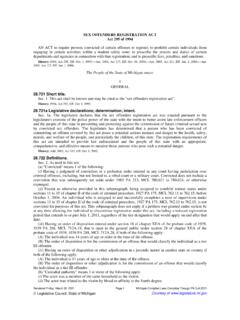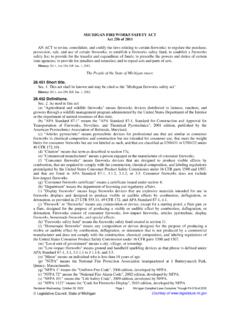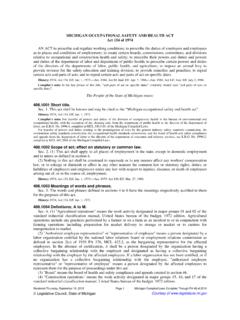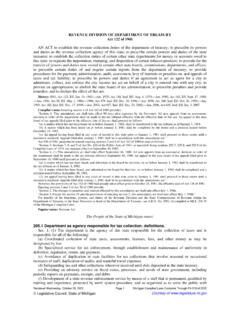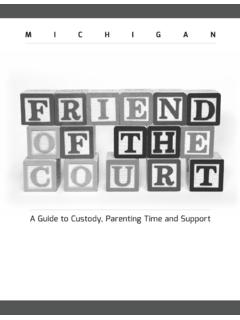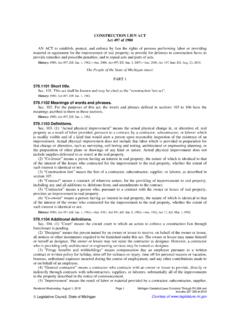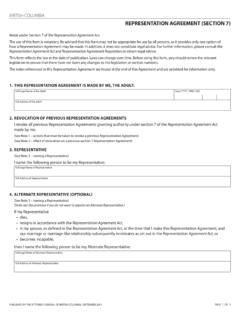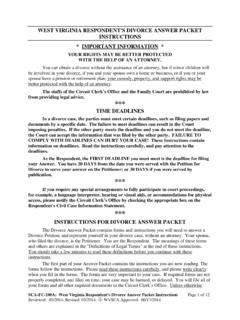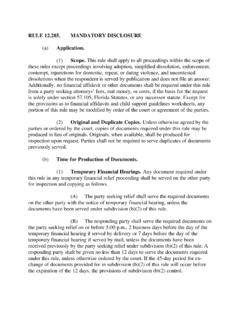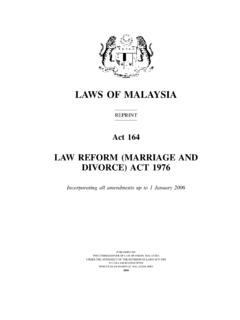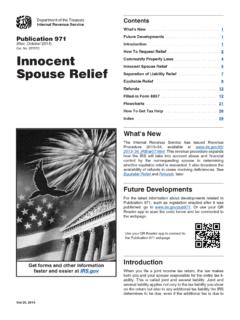Transcription of MICHIGAN
1 Friend CourtA Guide to Custody, Parenting Time and SupportMICHIGANo f t h eDear Friend,Welcome to MICHIGAN s Friend of the Court, a part of the circuit court family division supervised by the chief judge. The Friend of the Court assists the court administrator on issues of custody, parenting time and support, including medical and spousal. Throughout the years, the Friend of the Court office has undergone major legislative reform in order to strengthen child support and parenting time booklet describes the basic duties and procedures of the Friend of the Court and should only serve as a guide and not a substitute to seeking legal advice or contacting your local Friend of the Court when facing issues of custody, parenting time and hope this information is helpful to is accurate at the time of printing and provided in part by the Friend of the Court Bureau:State Court Administrative OfficeFriend of the Court Box 30048 Lansing, MI 48909 Phone: (517) 373-5975 Website: of ContentsIntroduction.
2 1 Rights and Responsibilities of the Parties .. 2 Friend of the Court Duties .. 3 Procedures of the Court .. 4 Starting a Court Case .. 4 Hearings .. 5 Court Orders .. 5 Alternative Dispute Resolution (ADR) .. 7 Information About Custody, Parenting Time and Support .. 9 Custody .. 9 Parenting Time .. 11 Support .. 14 Child Support Questions and Answers .. 17 Questions Regarding Miscellaneous Issues .. 18 Complaints .. 20 Additional Resources .. 21 Glossary of Frequently Used Terms .. 22 Prepared by the MICHIGAN LegislatureThis information is provided free to MICHIGAN citizens and is not for reproduction for resale or profit .(Rev. 4/2018)1 IntroductionThis handbook provides information about duties and procedures for the Friend of the Court (FOC), rights and responsibilities of parties in family law matters, and information about basic court procedures in domestic relations cases.
3 Family law matters can be difficult and painful . The family division of the circuit court is responsible for resolving the legal concerns which affect your family .Family law matters can be difficult for children . Parents can help by establishing or maintaining children s regular routines, encouraging frequent and regular contact between the child(ren) and both parents, being supportive of the other parent s participation in the child(ren) s school and other activities, and exchanging information regarding the child(ren) s need both parents . When you cooperate, you reassure your child(ren) that change will be positive . You also build the foundation for your new parental relationship and responsibilities . Your child(ren) will always want both of you to be part of their lives, to attend their high school or college graduations, to be at their weddings and the birth of their children, and to be part of other major life events . They want to be able to say that, despite what mom and dad may have felt toward one another, they always treated each other with courtesy and respect and never put their child(ren) in the middle of their dispute.
4 2 Rights and Responsibilities of the PartiesEach Party Has the Right to: Request a meeting with the Friend of the Court employee investigating a dispute about custody or parenting-time. Request the Friend of the Court to recommend whether a support or health insurance order should be modified . File a grievance with the Friend of the Court office concerning an employee or office procedure . Hire and consult with an attorney about any questions or concerns . Proceed in the case without Friend of the Court assistance (opt out) if agreed to by the other party and approved of by the court .Each Party Has the Responsibility to: Inform the Friend of the Court, in writing, of the following information: current residential and mailing addresses, current employer or source of income s name, address, and telephone number, current telephone number (residential or mobile), any occupational or driver s license held, and the driver s license number, social security number, unless exempt by law from disclosing that number, current residence of child(ren), current information regarding health care coverage available as a benefit of employment or maintained by either party.
5 Provide other information to assist the Friend of the Court in carrying out its duties as required by law . Obey all court orders .3 Friend of the Court DutiesMichigan law created Friend of the Court offices in 1919 . At least one office serves each circuit court s family of the Court offices have the following duties: When directed by the judge, the office investigates and makes recommendations to the court regarding: custody, parenting-time (which may include transportation), child support (including medical support, and sometimes spousal support) . Offers alternative dispute resolution (ADR) services, to help settle disagreements about custody or parenting-time. In cooperation with MICHIGAN State Disbursement Unit (MiSDU) the FOC collects, records, and distributes support payments as ordered by the court . Assists the court with enforcing orders on custody, parenting-time, and support. Provides forms that parties may use to file motions and responses regarding custody, parenting-time, support, change of domicile, and repayment plans.
6 Informs the parties of the availability of joint custody .The FOC has no authority to: Investigate criminal activity or abuse and neglect (but its employees in their professional capacity must report abuse and neglect) . Change an order . Give legal advice .Local FOC offices work with the Office of Child Support (OCS) and the Prosecuting Attorney s (PA) office to administer certain aspects of MICHIGAN s child support program under the child support requirements of the federal Social Security Act .Information in this handbook further describes general duties of the Friend of the Court . Specific procedures are established by local offices and may vary from office to office . Any questions regarding local procedures or requirements outlined in this handbook may be discussed with your local Friend of the Court, or with an attorney .To become familiar with some legal terms, please refer to the glossary on page 22 .Opt Out of Friend of the Court ServicesParties who agree that they do not need the FOC s services do not have to use them in certain circumstances.
7 They may file a joint motion to opt-out and, if the court approves the motion, the parties must then deal with each other directly. Before the court approves a motion to opt-out, the parties must file a document that shows they are voluntarily giving up FOC services .If an opt-out motion is filed at the same time as the complaint that starts the case, the court must order the Friend of the Court not to open a case unless one or more of the following are true: A party is eligible for Title IV-D services of the Social Security Act, 42 301 et seq. (child support services) because a party is receiving or has applied for public assistance . A party has applied for Title IV-D services. A party has requested the Friend of the Court to open a case . There is evidence of domestic violence or bargaining inequality and the request is against the best interests of a party or the parties parties also may file a motion requesting the court to order the Friend of the Court to close its case.
8 The court will issue the order unless it determines one or more of the following are true: A party objects to the closure . A party is receiving public assistance . Within the previous 12 months an arrearage or custody or parenting-time violation has occurred in the case . Within the previous 12 months a party to the case has reopened the Friend of the Court case . There is evidence of domestic violence or bargaining inequality and the request is against the best interests of a party or the parties child. The parties have not filed a jointly signed document with the court, that acknowledges the FOC services the parties are choosing to give up .Closing a Friend of the Court case requires the parties to assume full responsibility for administration and enforcement of the court orders . To assure proper accounting of support payments and their consideration in future proceedings, the parties may choose to have support payments made through the MiSDU even after the Friend of the Court case is closed.
9 If at any time a party applies for public assistance, requests any service from the FOC, or requests that a case be reopened, the FOC will reopen the case file . In these situations, the court may request that a party or the FOC prepare a written order to reopen the case .Procedures of the CourtStarting a Court CaseAnyone who wants to start a court case must file the correct papers in the family division of the circuit court according to MICHIGAN court rules and MICHIGAN Law . The court cannot require a party to use an attorney, but the majority of people do . Cases may involve difficult questions and knowledge of MICHIGAN and court proceedings .Plaintiff s ComplaintEach case begins with the plaintiff (the person requesting the court s assistance) filing papers which ask the court to decide a dispute (a complaint) concerning another party (the defendant) . The Plaintiff may ask the court to do any of the following: Grant a divorce . Order child support (including medical support) or spousal support.
10 Establish paternity . Establish custody of a child with one (or both) parties . Establish parenting-time with a court rules state that the defendant must be given a copy of the summons and complaint within the time stated on the summons . The summons tells the defendant to answer the complaint . The summons and complaint must be delivered in a way that gives the defendant notice that a case has been started . A Friend of the Court informational handbook must be served with the complaint whenever minor children are involved or spousal support is ordered .Defendant s Answer to ComplaintThe defendant is allowed time to answer the complaint . If an answer is not filed within the time frame permitted (usually 21 days after service), the defendant may lose the right to have his or her concerns heard by the judge . The plaintiff may seek the entry of a default and default judgment . This could result in an order granting the plaintiff s the complaint and answer have been filed, either party or the Friend of the Court may file a motion asking for orders deciding custody, parenting-time and child support.


